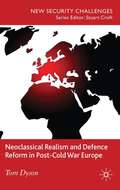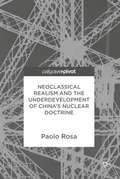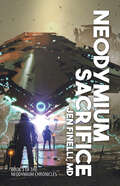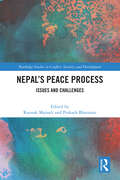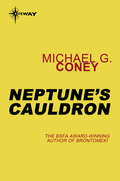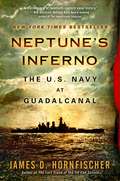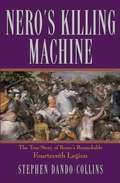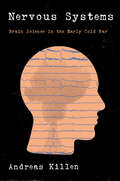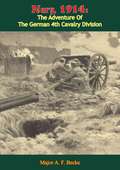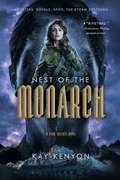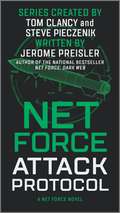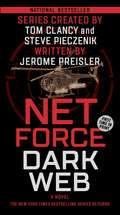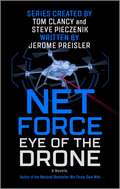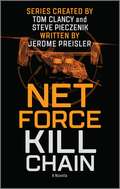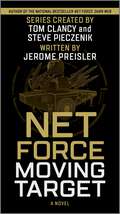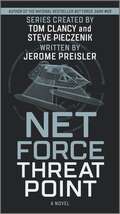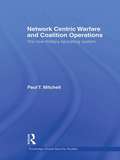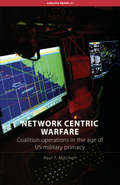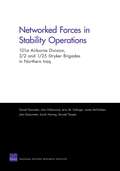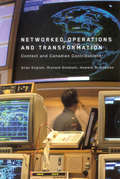- Table View
- List View
Neo-Medievalism and Civil Wars
by Neil WinnSince 1989 the concept of 'civil war' has taken on new salience in international relations. Significant inquiries into inter-ethnic violence emphasising studies of political community, identity, sovereignty, and political organisation have dominated the study of civil war in the past decade. Processes of social denationalisation of national identit
Neoclassical Realism and Defence Reform in Post-Cold War Europe
by To DysonDyson explains the convergence and divergence between British, French and German defence reforms in the post-Cold War era. He engages with cultural and realist theories and develops a neoclassical realist approach to change and stasis in defence policy, bringing new material to bear on the factors which have affected defence reforms.
Neoclassical Realism and the Underdevelopment of China’s Nuclear Doctrine
by Paolo RosaThis book addresses the under-researched discourse of the evolution of Chinese nuclear posture, and in particular, explains the absence from this evolution of a coherent and well-defined operational doctrine. Using a neoclassical realist framework, the book explains why China, after having launched a crash programme in the mid-1950s to develop a nuclear deterrent, did not debate a clear operational doctrine with respect to targeting and employment until the mid-1980s.
Neodymium Sacrifice (The Neodymium Chronicles)
by Jen FinelliAn &“intricately plotted&” space opera &“ups the already sky-high stakes,&” of this sci-fi series and fans &“will not be disappointed&” (Publishers Weekly). The Universe is nursing a morning-after hangover. That&’s how ex-freedom-fighter Lem Benzaran feels. Exiled after going AWOL to save her world, she lives in a changed galaxy in the aftermath of a purge that wiped entire planets clean of people like herself. A vague prophecy plagues her isolation: she&’s destined to cause the Universe&’s heat death. Jei Bereens is one of Lem&’s only contacts with her old life. Once his command team&’s golden boy, Jei&’s now under constant surveillance as a distrusted super-weapon. Worse, amidst waves of withdrawal from his lost love&’s nerve pheromone, Jei&’s struggling to break free of the childhood rival who&’s learned to use that vulnerability to trap him in his mind. That rival, Jared Diebol, now holds almost every card he needs to take full control of the forces bent on homogenizing the galaxy. Driven to desperation by Lem and Jei, Diebol&’s created a mind-control device that may finally turn Jei into the world-destroying machine he needs to end this war. If Lem tries to stop him, Diebol vows to kill her at Jei&’s hand. Between Jei&’s struggle for freedom, Lem&’s desperation to escape her destiny, and Diebol&’s hunt for control—someone has to give, and someone has to die.
Nepal’s Peace Process: Issues and Challenges (Routledge Studies in Conflict, Security and Development)
by Raunak Mainali Prakash BhattaraiThis volume provides a holistic overview of the long peace process in Nepal following the signing of the Comprehensive Peace Agreement (CPA) in 2006.The date of 21 November 2021 marked the 15th anniversary of the Comprehensive Peace Agreement (CPA) which concluded the decade-long civil war that had ravaged Nepal. Despite avoiding a resurgence of statewide conflict, Nepal’s post-conflict era has been far from perfect. This era has witnessed ethnic violence, rampant corruption, the politicisation of key public institutions and a failure to fully implement the provisions of the CPA. The resulting lack of socio-economic progress has led to large-scale dissatisfaction within the country and even given rise to elements within Nepal who reject the framework of the CPA and the 2015 constitution.With a focus on the years following the 2015 constitution, this book offers an analysis of post-conflict Nepal and explores issues relating to ex-combatants, transitional justice, women, socio-economic affairs, and federal governance. The contributors are all scholar-practitioners, some of whom had direct involvement in the peace process, and are therefore able to offer unique insights into the processes and challenges of Nepal’s long journey to addressing past grievances and promoting future peace in the country.This book will be of interest to students of peace studies, Asian politics, security studies and International Relations.
Neptune's Cauldron
by Michael G. ConeyPursued by the interplanetary police for a crime he did not commit, space traveller Tyg is forced down on the planet Storm, where he finds a revolution brewing among the Tadda against King Caiman, the planet's tyrannical ruler. He must prove his innocence of the crime with which he is charged, as he fights for survival beneath the Storm's seething oceans, where the very existence of the Tadda is threatened by the deadly undersea volcano known as NEPTUNE'S CAULDRON.
Neptune's Inferno: The U.S. Navy at Guadalcanal
by James D. HornfischerThe Battle of Guadalcanal has long been heralded as a Marine victory. Now, with his powerful portrait of the Navy’s sacrifice, James D. Hornfischer tells for the first time the full story of the men who fought in destroyers, cruisers, and battleships in the narrow, deadly waters of “Ironbottom Sound.” Here, in stunning cinematic detail, are the seven major naval actions that began in August 1942, a time when the war seemed unwinnable and America fought on a shoestring, with the outcome always in doubt. Working from new interviews with survivors, unpublished eyewitness accounts, and newly available documents, Hornfischer paints a vivid picture of the officers and enlisted men who opposed the Japanese in America’s hour of need. The first major work on this subject in almost two decades, Neptune’s Inferno does what all great battle narratives do: It tells the gripping human stories behind the momentous events and critical decisions that altered the course of history and shaped so many lives.
Nero's Killing Machine: The True Story of Rome's Remarkable Fourteenth Legion
by Stephen Dando-CollinsAn exciting narrative of the history of Rome's Fourteenth Legion
Nerve Agents in Postwar Britain: Deterrence, Publicity and Disarmament, 1945–1976 (Britain and the World)
by William KingThis book reveals the nature and level of British engagement with controversial and lethal nerve agent weapons from the end of the Second World War to Britain’s submission of a draft Chemical Weapons Convention. At the very heart of this highly secretive aspect of British defence policy were fundamental questions over whether Britain should acquire nerve agent weapons for potential first-use against the Soviet Union, retain them purely for their deterrence value, or drive for either unilateral or international chemical weapons disarmament. These considerations and concerns over nerve agent weapons were not limited to low-level defence committees, nor were they consigned to the periphery, but featured prominently at the highest levels of the British government and defence planning. Importantly, and despite stringent secrecy, the book further uncovers how public scrutiny and protest movements played a substantial and successful part in influencing policy and attitudes towards nerve agent weapons.
Nervous Systems: Brain Science in the Early Cold War
by Andreas KillenIn this eye-opening chronicle of scientific research on the brain in the early Cold War era, the acclaimed historian Andreas Killen traces the complex circumstances surrounding the genesis of our present-day fascination with this organ.The 1950s were a transformative, even revolutionary decade in the history of brain science. Using new techniques for probing brain activity and function, researchers in neurosurgery, psychiatry, and psychology achieved dramatic breakthroughs in the treatment of illnesses like epilepsy and schizophrenia, as well as the understanding of such faculties as memory and perception. Memory was the site of particularly startling discoveries. As one researcher wrote to another in the middle of that decade, “Memory was the sleeping beauty of the brain—and now she is awake.” Collectively, these advances prefigured the emergence of the field of neuroscience at the end of the twentieth century.But the 1950s also marked the beginning of the Cold War and a period of transformative social change across Western society. These developments resulted in unease and paranoia. Mysterious new afflictions—none more mystifying than “brainwashing”—also appeared at this time. Faced with the discovery that, as one leading psychiatrist put it, “the human personality is not as stable as we often assume,” many researchers in the sciences of brain and behavior joined the effort to understand these conditions. They devised ingenious and sometimes transgressive experimental methods for studying and proposing countermeasures to the problem of Communist mind control. Some of these procedures took on a strange life of their own, escaping the confines of the research lab to become part of 1960s counterculture. Much later, in the early 2000s, they resurfaced in the War on Terror.These stories, often told separately, are brought together by the historian Andreas Killen in this chronicle of the brain’s mid-twentieth-century emergence as both a new research frontier and an organ whose integrity and capacities—especially that of memory—were imagined as uniquely imperiled in the 1950s. Nervous Systems explores the anxious context in which the mid-century sciences of the brain took shape and reveals the deeply ambivalent history that lies behind our contemporary understanding of this organ.
Nery, 1914: The Adventure of the German 4th Cavalry Division
by Major A. F. BeckeFascinating account of the apparently minor chance encounter between German and British cavalry, supported by artillery, in the opening stages of the First World War as the German army wheeled through Belgium and Northern France. The engagement was a tenacious struggle and L Battery of the Royal Horse Artillery won three VCs and the honour title "Nery" during this clash.Illustrated with 4 sketches and 4 photographs.
Nest of the Monarch (A Dark Talents Novel)
by Kay KenyonKim Tavistock, undercover in Berlin as the wife of a British diplomat, uncovers a massive conspiracy that could change the course of the war—and she’s the only one in position to stop it in the electrifying conclusion to the Dark Talents series. November, 1936. Kim Tavistock is in Berlin on her first Continental mission for SIS, the British intelligence service. Her cover: a sham marriage to a handsome, ambitious British consul. Kim makes the diplomatic party circuit with him, hobnobbing with Nazi officials, hoping for a spill that will unlock a secret operation called Monarch. Berlin is a glittering city celebrating Germany’s resurgence, but Nazi brutality darkens the lives of many. When Kim befriends Hannah Linz, a member of the Jewish resistance, she sets in motion events that will bring her into the center of a vast conspiracy. Forging an alliance with Hannah and her partisans, Kim discovers the alarming purpose of Monarch: the creation of a company of enforcers with augmented Talents and strange appetites. Called the Progeny, they have begun to compel citizen obedience with physical and spiritual terror. Soon Kim is swept up in a race to stop the coming deployment of the Progeny into Europe. Aligned against her are forces she could never have foreseen, including the very intelligence service she loves; a Russian woman, the queen of all Talents, who fled the Bolsheviks in 1917; and the ruthless SS officer whose dominance and rare charisma may lead to Kim’s downfall. To stop Monarch and the subversion of Europe, she must do more than use her Talent, wits, and courage. She must step into the abyss of unbounded power, even to the point of annihilation. Does the human race have limits? Kim does not want to know the answer. But it is coming.
Net Force: Attack Protocol
by Jerome PreislerThe cutting-edge Net Force thriller series, created by Tom Clancy and Steve Pieczenik and written by Jerome Preisler, reveals the invisible battlefield where the war for global dominance is fought.The president’s new cybersecurity team, Net Force, is up and running. But a political deadlock in Washington makes the young agency dangerously vulnerable to the criminals, terror groups and hostile governments who would use the digital space to advance their destructive goals.In Central Europe, an unknown enemy mounts a crippling high-tech assault against the organization’s military threat-response unit on its home base. The strike casts suspicion on a core member of Net Force, threatening to destroy the cyber defense group from within. But as they race to track down their attackers, the stakes are suddenly ratcheted higher. For a global syndicate of black hat hackers and a newly belligerent Russia are hatching a mysterious, shadowy scheme for world domination from a place known only as the Secret City.Their attack protocol: leave Net Force in ashes while Moscow and its Dark Web allies set the stage for a devastating strike against the United States.Unless the men and women of Net Force can regroup in time to stop them.
Net Force: Dark Web
by Jerome PreislerThe return of the cutting-edge thriller series Net Force, created by Tom Clancy and Steve Pieczenik and written by Jerome Preisler.The number one threat to our nation’s security is in cyberspace. The new US president wants to tackle the urgent problem head-on and launches a top secret line of defense: Net Force. But before the organization can be announced, the country is hit by an unprecedented, two-pronged terror attack.Not yet empowered by Congress nor embraced by a dubious intelligence community, still untested, unproven and officially unnamed, Net Force’s elite group of cyber experts and field operatives must lead the fight against the ongoing waves of hacks while tracking down the mastermind. Their failure could mean global catastrophe. Success may lead them to become the highest-level security agency in the United States.A story that seems ripped from tomorrow’s headlines, Net Force: Dark Web relaunches one of the most prescient thriller series at a time when cybersecurity is more vital than ever.
Net Force: Eye of the Drone
by Jerome PreislerAn all-new novella in the New York Times bestselling Net Force series, created by Tom Clancy and Steve Pieczenik and written by Jerome Preisler.In Munich, a renowned computer scientist dies. Then, his daughter vanishes. Both under mysterious circumstances.Kali Alcazar, a master hacker, wants to know why. As she delves deeper into the suspicious events, she spots something in the sky — a rare, advanced drone -- and realizes she’s a target herself. A group of mercenary assassins has been assembled with just one goal: to stop Kali from exposing a dark, world-changing secret. Stop her at any cost.They’re not the only ones who are hunting Kali. CIA manhunter Mike Carmody and his elite special ops team are hot on her trail. Their task—bring her to Washington as an internationally wanted cyber-criminal. But that simple mission suddenly becomes a lot more dangerous than they bargained for.In this thrilling novella, the lines blur between hunter and hunted in a battle for tech dominance whose explosive outcome ultimately may be decide the future of international security.
Net Force: Kill Chain
by Jerome PreislerA remote Maine island becomes the setting for a deadly game of cat-and-mouse in the Net Force novella KILL CHAIN.Natasha Mori and Bryan Ferrago work for the Net Force Cyber Squad, an elite government agency created to lead the charge against America&’s online enemies. They&’ve traveled to Maine&’s coast for a project to study extreme weather forecasting—and hopefully enjoy a little vacation.But someone from Natasha&’s past has followed them and, as a hurricane approaches, sees a chance to take her out of commission permanently. A team of elite biotech-enhanced mercenaries has been assigned to eliminate her and any witnesses on the island.Stranded in the storm of the century, cut off from all help, Natasha and Bryan must now find a way to escape her hunters—or become part of their murderous kill chain.
Net Force: Moving Target (Net Force Series #4)
by Jerome PreislerA NEW BATTLE IS BREWING—ONE THAT WILL SOON RAGE ACROSS ALL POLITICAL AND GEOGRAPHIC LINES.As this new threat escalates, the US president calls on the members of Net Force to prevent global chaos.In Paris, the leader of a new political movement has gone into hiding, pursued by a relentless group of bioenhanced assassins. Seeking to rescue him in the mysterious catacombs beneath the city is one of Net Force&’s own, Kali Alcazar, who has become a hunted fugitive herself.Halfway across Europe, meanwhile, her friends are about to strike at the heavily armed fortress of the world&’s most dangerous hacker…and he's prepared a deadly trap for them.&“Jerome Preisler takes us deep into the dark side of the web.&” —Jim DeFelice on Net Force: Attack Protocol&“A tightly woven, expertly crafted story with a finger on the pulse of the overwhelmingly clear and present danger of cyberterrorism.&” —Marc Cameron on Net Force: Dark Web
Net Force: Threat Point (Net Force Series #3)
by Jerome PreislerTHE UNITED STATES MAY SEEM SAFE FROM WITHIN BUT BEYOND ITS BORDERS, A NEW ENEMY RISES An American ship has vanished. The president has tasked the new cyber-intelligence agency, Net Force, with finding out what happened to the vessel. But their investigation reveals a plan that could trigger a world war. Their only option is to strike first. Through the streets of New York, a secret city in Crimea and the depths of the South China Sea, Net Force must race to discover who is behind the attack…before it's too late. &“Jerome Preisler takes us deep into the dark side of the web.&” —Jim DeFelice on Net Force: Attack Protocol &“A tightly woven, expertly crafted story with a finger on the pulse of the overwhelmingly clear and present danger of cyberterrorism.&” —Marc Cameron on Net Force: Dark Web
Network Centric Warfare and Coalition Operations: The New Military Operating System (Routledge Global Security Studies)
by Paul T. MitchellThis book argues that Network Centric Warfare (NCW) influences how developed militaries operate in the same fashion that an operating system influences the development of computer software. It examines three inter-related issues: the overwhelming military power of the United States; the growing influence of NCW on military thinking; and the centrality of coalition operations in modern military endeavours. Irrespective of terrorist threats and local insurgencies, the present international structure is remarkably stable - none of the major powers seeks to alter the system from its present liberal character, as demonstrated by the lack of a military response to US military primacy. This primacy privileges the American military doctrine and thus the importance of NCW, which promises a future of rapid, precise, and highly efficient operations, but also a future predicated on the ‘digitization’ of the battle space. Participation in future American-led military endeavours will require coalition partners to be networked: ‘interoperability’ will therefore be a key consideration of a partner’s strategic worth. Network Centric Warfare and Coalition Operations will be of great interest to students of strategic studies, international security, US foreign policy and international relations in general.
Network Centric Warfare: Coalition Operations in the Age of US Military Primacy (Adelphi series)
by Paul T. MitchellSince its emergence in 1998, the concept of Network Centric Warfare (NCW) has become a central driver behind America’s military ‘transformation’ and seems to offer the possibility of true integration between multinational military formations. Even though NCW, or variations on its themes, has been adopted by most armed services, it is a concept in operational and doctrinal development. It is shaping not only how militaries operate, but, just as importantly, what they are operating with, and potentially altering the strategic landscape. This paper examines how the current military dominance of the US over every other state means that only it has the capacity to sustain military activity on a global scale and that other states participating in US-led coalitions must be prepared to work in an ‘interoperable’ fashion. It explores the application of computer networks to military operations in conjunction with the need to secure a network’s information and to assure that it accurately represents situational reality. Drawing on an examination of how networks affected naval operations in the Persian Gulf during 2002 and 2003 as conducted by America’s Australian and Canadian coalition partners, the paper warns that in seeking allies with the requisite technological capabilities, but also those that it can trust with its information resources, the US may be heading towards a very secure digital trap.
Network-Centric Naval Forces: A Transition Strategy for Enhancing Operational Capabilities
by Naval Studies Board National Research CouncilInformation on Network-Centric Naval Forces
Networked Forces in Stability Operations: 101st Airborne Division, 3/2 and 1/25 Stryker Brigades in Northern Iraq
by Jerry M. Sollinger John Hollywood Daniel Gonzales James Mcfadden John DejarnetteCompares three units that conducted stability operations in the same area in northern Iraq-the 101st Airborne Division (which had only limited digital communications), the 3/2 Stryker brigade combat team (SBCT), and the 1/25 SBCT (both equipped with digital networks) and finds that leadership, training, and tactics and procedures are just as important as networking capabilities for improving mission effectiveness in stability operations.
Networked Insurgencies and Foreign Fighters in Eurasia
by Jean-François Ratelle and Laurence BroersRecent wars in Eurasia have foregrounded the flows of foreign fighters between distinct insurgent battlefronts. Since 2011 thousands of individuals have travelled from the Caucasus and Central Asia to fight in Syria and Iraq. Caucasians have also appeared in the fighting that followed Ukraine’s Euromaidan Revolution in 2014. Resolutions of these conflicts promise further movements as foreign fighters return home. This collection of articles presents for the first time in one volume a cross-regional comparative perspective on the trajectories of foreign fighters between the Caucasus, Central Asia, the Middle East and Ukraine. Drawing on extensive primary sources, contributors theorize the life cycles of foreign fighter waves and the respective roles played by pre-existing insurgent networks, transnational ideologies such as "global jihad" and "Eurasianism", and propaganda framing by insurgent groups such as the Islamic State. They examine regional state responses to the security threat posed by foreign fighters, showing how current security governance regimes can reinforce insurgent ideologies attracting violent militants. Finally they investigate the motivations for foreign fighters to return to their home states in the Caucasus and Central Asia. Arguing for the networked character of insurgencies in Eurasia, this book offers a unique overview of the foreign fighter phenomenon across the continent. It was originally published as various special issues of Caucasus Survey, Terrorism and Political Violence and Studies in Conflict & Terrorism.
Networked Operations and Transformation
by Richard Gimblett Howard Coombs Allan EnglishThe authors consider various approaches to networked operations that are based on the physical environment and cultural context in which armed forces operate. They conclude that a "one size fits all" approach to command and control for networked operations may not be the most effective and suggest a more human-centric approach than the primarily technology-centred model used by the U.S. military.
Networked Operations and Transformation: Context and Canadian Contributions
by Richard Gimblett Howard Coombs Allan EnglishThe authors consider various approaches to networked operations that are based on the physical environment and cultural context in which armed forces operate. They conclude that a "one size fits all" approach to command and control for networked operations may not be the most effective and suggest a more human-centric approach than the primarily technology-centred model used by the U.S. military.

